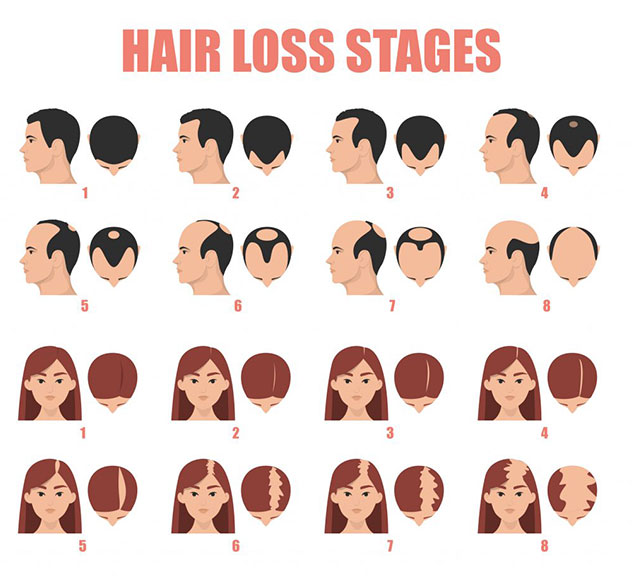
Mega Doctor News
A world-renowned hair loss expert from Chula has discovered that low-level laser treatment can stimulate hair follicles and hair growth. Guaranteed by a world-class award, this treatment for thinning hair and hair loss can deliver results in 24 weeks.
Thinning hair, hair loss, and baldness can sabotage the self-confidence and quality of life of people of all genders and ages. Those who suffer these problems struggle to find the right treatments, like changing shampoos, cutting their hair short, taking supplements, avoid using chemicals on the scalp, etc., to no avail. One of the reasons for the failure is not tackling the problem at its root cause, especially in the case of genetic hair thinning, and hair loss.
Assoc. Prof. Ratchathorn Panchaprateep, M.D., Head of the Hair and Scalp Center, Chulalongkorn Memorial Hospital, Thai Red Cross Society and lecturer of the Division of Dermatology, Department of Medicine, Faculty of Medicine, Chulalongkorn University, in her research on “Proteomic Analysis in Derma Papilla from Male Androgenetic Alopecia after Treatment with Low-Level Laser Therapy” that received an award from the International Society of Hair Restoration Surgery (ISHRS) proves that the use of low-level laser therapy can stimulate the scalp and hair growth in 24 weeks.
Warning signs of “unusual hair loss”
“Whenever more than 70 to 100 strands of hair fall off each day, that’s a sign of abnormal hair loss. This needs immediate attention and consultation with dermatologists,” said Assoc. Prof. Dr. Ratchathorn.
“Normally, you can lose some hair when shampooing, blow-drying, or combing every day. However, if you encounter unusual hair loss during the day, e.g. during meals or walking around at work, that is another sign of abnormality, and you should see a hair-and-scalp specialist. Men have short hair, and it’s hard to notice hair loss during the day. You should pay attention right after you wake up to see if there is any hair on the pillow.”
For men, thinning hair, and hereditary hair loss usually starts in the front and recedes into an M-shaped hairline. Some develop a bald patch in the crown that gradually spreads out. For women, thinning tends to start at where the hair parts, and gradually worsen as time passes.
“Hair thinning and genetic hair loss are different from thinning hair caused by an abnormal immune system (Alopecia Areata) that causes round patches of hair loss the size of a 10-baht coin,” Assoc. Dr. Ratchathorn, M.D. added.
Cause of thinning hair, hair loss, and baldness
Assoc. Prof. Dr. Ratchathorn revealed that, statistically, up to 40 percent of Thai people have thinning hair, hair loss, and baldness problems. The number is on the upward trends every year, with the current environment — stress, weather conditions, and bad diet. Hair problems and baldness can occur in both females and males, but in the latter, the problem starts at a young age and the conditions are more severe than in females. The main causes of hair and scalp problems are as follows:
- Genetics – Outstanding genes from the father or mother with thinning hair, or scalp problems;
- During puberty, the male hormone testosterone will stick to the hair follicles, causing both the follicles and the hair to become thinner, and fall off easily;
- Environmental factors such as stress, sunlight, malnutrition, vitamin deficiency, etc., can also be the culprit. Nowadays, hereditary hair loss is increasingly found in younger people.
Low-level laser therapy – a new alternative to restore life to your hair
Currently, there are three popular treatments for genetic hair loss: Taking Finasteride medication to stop testosterone from sticking to the hair follicles and to slow down hair loss; applying Minoxidil topically and continuously to the scalp to plump up and thicken the hair, and hair transplant surgery by transplanting the hair from the denser area. This method is suitable for severe and advanced cases. The advantage of this method is that the hair will last a lifetime, and can be permed, dyed, and washed. People with hair transplants can engage in any sports activities with confidence.
Recently, low-level laser therapy — a new treatment that is effective with fast results became available. There are two types:
- Laser cap or comb – the accessories that emit red laser light ‘Low-level laser therapy (LLLT)’ to gently stimulates hair follicle cells. Suitable for those who have thinning hair in the initial to moderate stage, this device is portable and can be used at home. Using this device continuously for 15 minutes a day will strengthen the hair and hair follicles, as well as generate new and thicker hair growth. However, patients should consult the doctor for directions on use, and device type.
- Low-level laser adapted from the laser used for hair removal. It is a low-energy laser to stimulate the hair follicles all over the scalp.
“This low-level laser therapy is suitable for patients with an early stage of hair loss i.e. with mild to moderate symptoms, but not suitable for those in an advanced stage, or already have baldness. Patients should undergo the therapy continuously at least 5 – 10 times, every two weeks. They will start to see the result after the 5th treatment. Clearer results can be seen after three months. Patients will have new growth of stronger hair,” Assoc. Prof. Dr. Ratchathorn said.
This is the first research in Asia to confirm the efficacy of low-level laser therapy for genetic hair loss, making Assoc. Prof. Dr. Ratchathorn the first Thai female doctor to win the highest Platinum Follicle Award 2019 from the International Society of Hair Restoration Surgery (ISHRS) for her professional excellence and research on hair.
“Even though genetic hair loss cannot be cured, the current treatment can extend the hair’s life and scalp health. Most important is to keep your body strong with a healthy diet especially protein, get enough sleep and avoid stress,” Assoc. Prof. Dr. Ratchathorn concluded.











